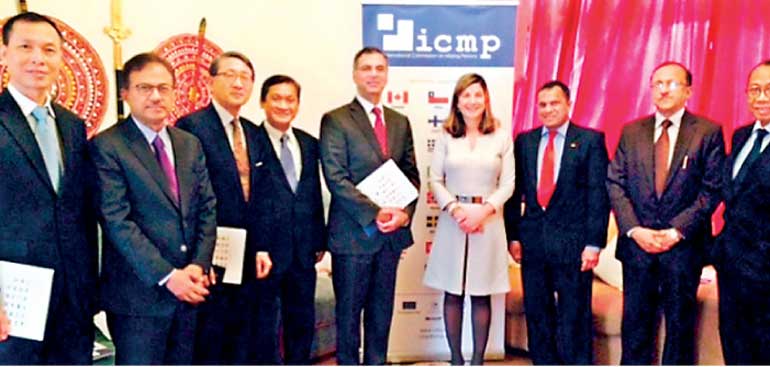Sunday Feb 22, 2026
Sunday Feb 22, 2026
Tuesday, 3 May 2016 00:01 - - {{hitsCtrl.values.hits}}
Sri Lanka’s Ambassador to the Netherlands A.M.J. Sadiq last week hosted a meeting of ambassadors from Asia in The Hague to highlight the work of the International Commission on Missing Persons (ICMP) and to discuss the issue of missing and disappeared persons in the region.
ICMP first worked in Asia when its staff were deployed in Thailand to help identify victims of the December 2004 tsunami. Since then it has cooperated with the authorities in the Philippines and Vietnam. In October 2015 it launched a series of consultations in Sri Lanka with a view to contributing to a comprehensive, countrywide effort to account for the large numbers of missing from the 25-year conflict.
“The issue of missing persons is a global phenomenon, and Asian countries are unfortunately also affected by it, through a variety of causes,“ Ambassador Sadiq said, adding that since ICMP now has its headquarters in The Hague it was possible to invite ambassadors to meet with ICMP Director-General Kathryne Bomberger to learn more about ICMP’s mandate and activities.
“ICMP is an independent and impartial international organisation, and its work is complementary to that of the work of other international organisations in the field, especially with regard to post-conflict management and the enhancement of the rule of law,” Sadiq said.

“Asian governments are facing profound challenges related to missing and disappeared persons,” Bomberger said during the meeting. “Mass migration, natural disasters, conflict and social unrest raise specific missing persons issues. The important thing to remember is that effective strategies have been developed and governments and other stakeholders can address the issue successfully by working with one another and with international organisations. Initiatives that have worked in one country may work in other countries.”
Bomberger said ICMP “can make a continuing contribution to creative and effective efforts to address missing persons issues whether in the context of migration, post-conflict recovery or disaster recovery.” She stressed the primacy of a rule-of-law approach in which authorities fulfil their legal obligations to account for the missing.
She also urged Asian countries to sign the Agreement on the Status and Functions of the International Commission on Missing Persons. The Agreement does not entail any financial obligations on the part of signatories but allows countries to participate more fully in a global dialogue on the issue of the missing. It also facilitates ICMP engagement in signatory countries. So far, the ICMP Agreement has been signed by the Netherlands, the United Kingdom, Sweden, Belgium, Luxembourg, El Salvador, Chile and Serbia.
In addition to Sri Lanka, which hosted the event, today’s briefing was attended by ambassadors of Afghanistan, Bangladesh, India, Indonesia, Japan, the Republic of Korea, Malaysia, Pakistan, the Philippines, and Vietnam.
ICMP endeavors to secure the co-operation of governments and other authorities in locating and identifying persons who go missing as a result of conflict, human rights abuses, disasters, organized crime, migration and other circumstances. It also supports the work of other organizations in their efforts, encourages public involvement in its activities and contributes to the development of appropriate expressions of commemoration and tribute to the missing.
ICMP was created in 1996, following the G-7 Summit in Lyon, France. ICMP endeavors to secure the co-operation of governments and other authorities in locating and identifying persons missing as a result of armed conflicts, other hostilities or violations of human rights and to assist governments or authorities in doing so.
Since its establishment in 1996 ICMP has been funded through voluntary grants, donations and contributions from the following participating Governments: Canada, Czech Republic, Chile, Denmark, Finland, France, Germany, Greece, The Holy See, Iceland, Ireland, Italy, The Netherlands, Norway, Poland, Spain, Sweden, Switzerland, Thailand, Turkey, The United Kingdom, The United States of America and The European Union.